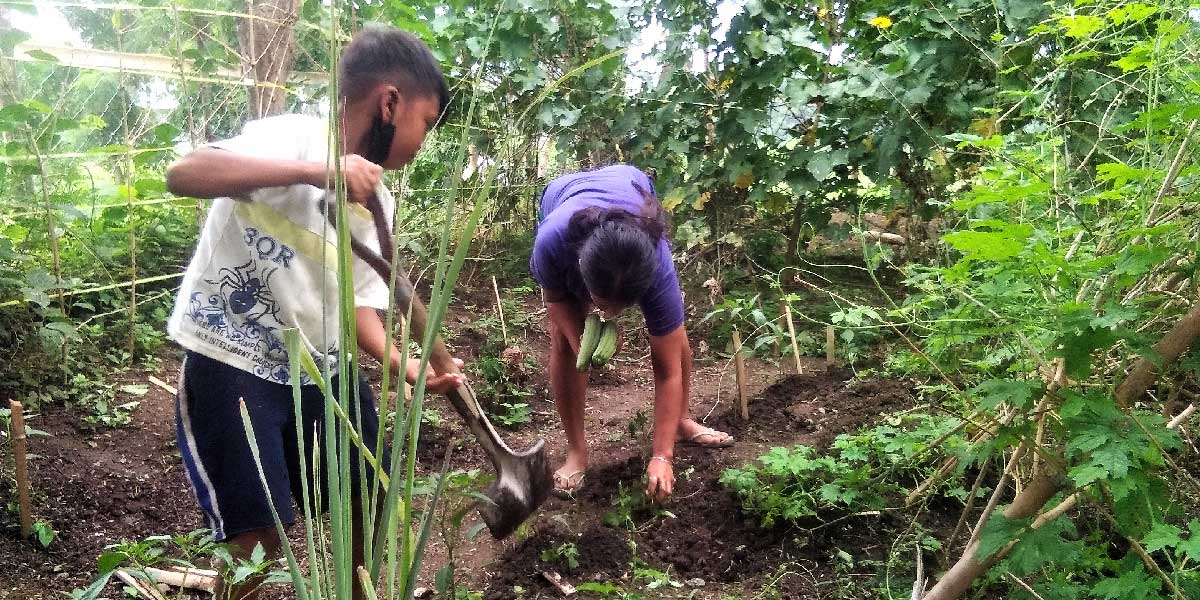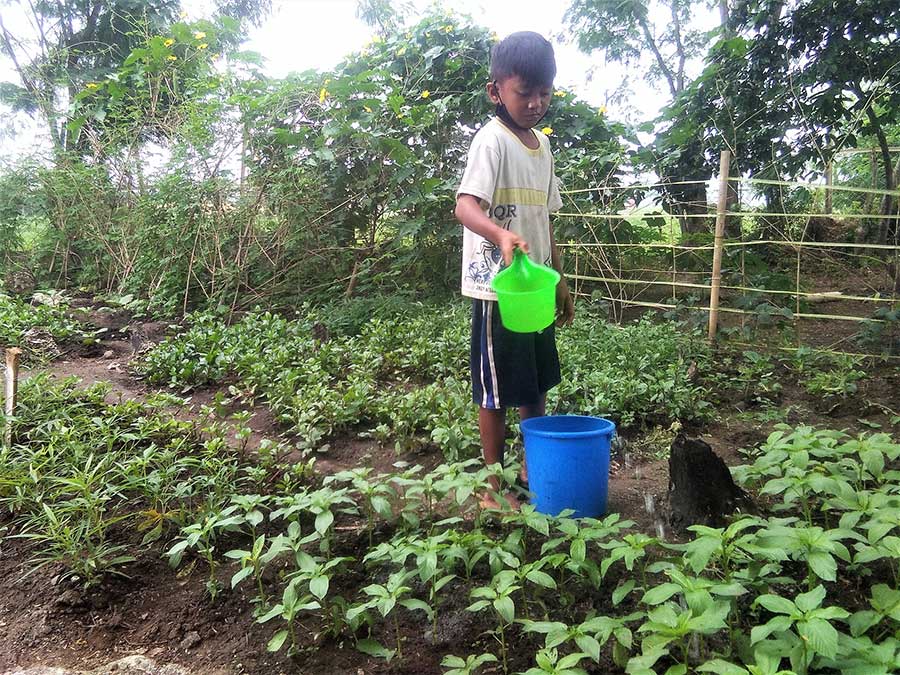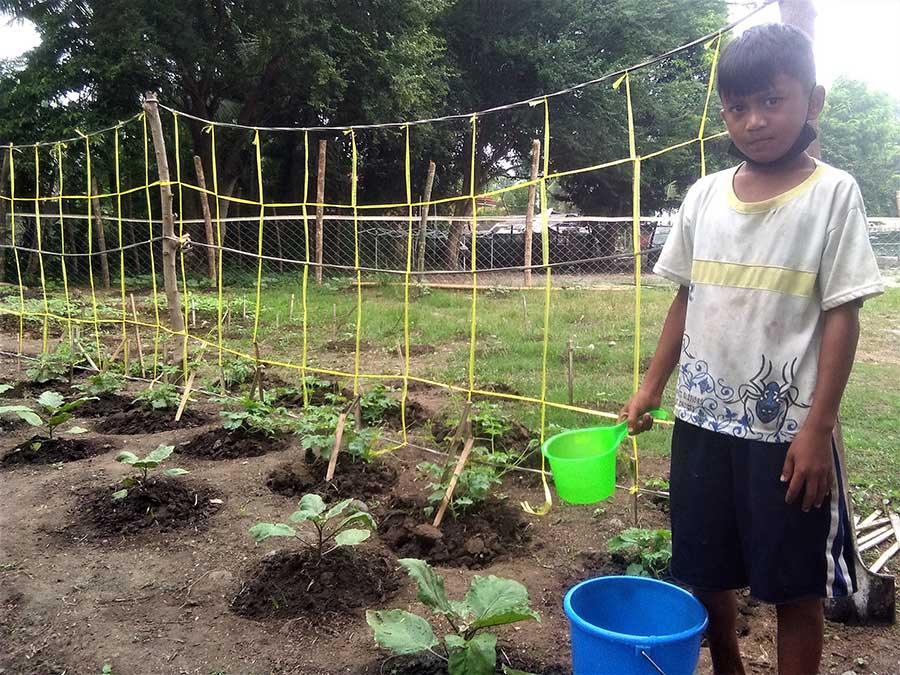
By Maria Rose S. Castro
Mark Jan Diaz and his mother went out to the backyard while humming the classic Filipino folk song “Bahay Kubo” as they literally tended to the garden and picked some vegetables.
The backyard garden has common vegetables that the Diaz household in Brgy. Amparo, Pavia, Iloilo cook for their daily meals.
They grow Dahon Kamote, Dahon Sibuyas, Alugbati, Patola and Talong or also known in the same order as Sweet Potato Leaves, Onion Leaves, Malabar Spinach, Silk Squash, and Eggplant.
Gardening is a component of the TLE subject and students learn planting and managing a garden in school before the pandemic. But education has shifted online and learning activities that were formerly carried out face-to-face were discouraged; as such, the physical activity component of the TLE subject suffered a setback.”
Yet the controlled movement of people because of COVID-19 prevention measures has likewise resulted in limited access to food, especially common vegetables used for everyday cooking. The circumstances highlighted the importance of innovating the TLE subject by modifying the approach to gardening through a transition of setting from the school to the home.

Blended learning using experiential teaching approach
Pavia National High School developed the concept of transition learning for students and I authored the innovative program, entitled: “Home Gardening Self-Sustaining Learning in TLE.”
The program employs an “experiential teaching approach” – a hybrid learning which uses blended instruction with online lecture and actual application of the concepts by students at home.
In fact, home gardening has been part of our traditional household practices, as such, it made its way in the TLE program and it is not difficult to implement.
The teaching approach is also fostered from the pandemic adaptation strategy of the Dept. of Education (DepEd) and it complemented programs like the “Gulayan sa Paaralan” or GP, “School Inside a Garden” (SIGA), and more recently DepEd Region VI “Home Gardening Program” – initiatives aimed to raise awareness of the importance of vegetables farming and to cultivate sustainable community practices among students.

Sustainable practices that ensure food security for the family is attainable even on a small scale like converting used vessels into recycled pots or utilizing a tiny patch of land in the backyard as a garden.
This innovative program is being piloted on Mark Jan’s household, he selected since his family is considered among marginalized sectors in their barangay. The project intends to deliver not only education, but also food sustainability.
The learning design for Mark Jan was undertaken with the presence of his parents. A lecturer visited him to give an orientation on the basic principles of home gardening with a discussion on what type of food crop to grow; selection guide for a garden location; making of garden bed, and use of basic gardening tools.
Mark also learned how to grow from seeds or transplant seedlings and even seeds and seedlings management, basics that are tackled in agriculture classes.

In addition, Mark also acquired an understanding of the food chain and an overview of concepts like the value chain with prevailing trends like online selling, order making through social media, and food safety practices for pick-up.
Similarly, Mark Diaz was mentored to appreciate the economic value of food gardening as a livelihood activity by applying simple financial management systems like listing down start-up expenditures, logging of expenses within the duration of planting to harvesting period, and how to compute net pay and income.
Experiential teaching of home gardening is scalable
The piloting on Mark Jan Diaz yielded positive results and the outcome illustrates potential scalability of its application to all 254 learners on TLE for the next school year.
Monitoring and reports from the learning initiative demonstrate that home gardening delivered multiple accomplishments like improved nutrition on Mark Jan and the Diaz Family. It also lowered emotional stress and it reduced risk behaviour like tendencies for aggression.
One of the inspiring results of the home gardening pilot learning is on the Diaz Family itself. It stimulated family interest in gardening with family members taking proactive effort in garden management and maintenance. In the process, the learning method strengthened family relations with parents helping out in home gardening, mentoring Mark of practical ways to maintain the garden, and enjoying the result through collective harvest.
Further, it was observed that socialization within the family through home gardening also nurtured the condition of unity, cooperation and mutual support within the family during a period of crisis like a pandemic, and which can heighten their level of survival.
An important element of the result gathered from piloting is focused on Mark himself. The author’s examination revealed that the student displayed self-discipline as he rigorously applied the home gardening practices from the series of on-site lectures including progress monitoring and reporting back to the TLE teacher during home visits.
It is encouraging to listen to Mark who exhibited enthusiasm by reporting the progress of his home activity with written reports and even selfies with the garden in the background.”
Mark developed a sense of ownership and appreciation of the value of labor and cooperation by family members.
Indubitably, “the home-based activity can serve as a means for improved physical well-being, upgrading of knowledge on agriculture and food security, and training students in problem solving and learning decision making.
The piloting result of “Home Gardening Self-Sustaining Learning in TLE” unveiled a realization that home gardening can trigger transformations among students and their families in spite of online learning set-up.
The positive impact from the piloting serves to motivate TLE teachers to innovate ways on how to effectively bring learning methods at home to better prepare students for the future. The author only aspires that innovations by teachers similar to what she has authored will eventually receive the kind of support that it needed in order to sustain its benefits among students, their families and eventually their communities.
(Maria Rose S. Castro is the author of “Home Gardening Self-Sustaining Learning in TLE” and has been teaching for 7 years now. The news story was produced by the writer with a written consent from the mother of Mark Jan Diaz for the use of his actual name and photos for the story.)






















